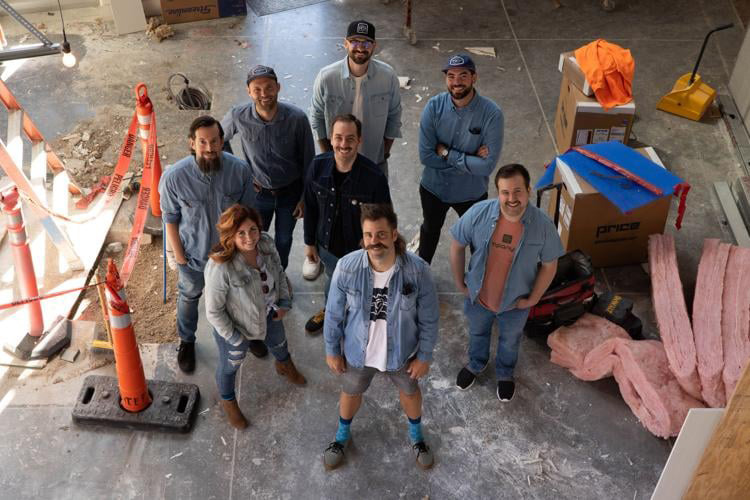The following article is part of a special insert in the June 3-9 issue of The Reader, a weekly newspaper focusing on the area’s culture. The insert, titled disRUPT, is the result of a partnership between The Reader, Scott Technology Center – an incubator and data center aiming to enhance technology and innovation in Omaha’s business community – and Silicon Prairie News.
For high-tech entrepreneurs, cutting-edge communicators and government grant recipients, making the right connections sometimes means the difference between explosive growth and standing still.
Enter Innovation Accelerator, located at the Scott Technology Center. Designed to help set in motion viable ideas with positive economic potential, Innovation Accelerator’s experts create unions and forge paths between like-minded individuals, progressive corporations, academicians, forward-thinking small business owners and others.
 The result: A push for excellence in an increasingly competitive technology marketplace — the same push that’s helping make Nebraska’s Silicon Prairie concept a reality.
The result: A push for excellence in an increasingly competitive technology marketplace — the same push that’s helping make Nebraska’s Silicon Prairie concept a reality.
“Omaha is a really unique place, really engaged,” said Traci Hancock (left, photo by Marlon A. Wright), executive director, Innovation Accelerator. “We want to see the community grow and prosper.”
While Hancock concedes the metro is not always perceived as “a traditional innovation hub” she, and others, recognize the synergies between the Scott Technology Center, Peter Kiewit Institute, University of Nebraska at Omaha and University of Nebraska-Lincoln, students and startups. Such cooperative practices mean more and more cutting-edge corporations are choosing Omaha-based innovations to meet their technology needs.
An example is Omaha’s recent Cyber Security Workshop, co-hosted by Innovation Accelerator, the Scott Technology Center and The Peter Kiewit Institute. The workshop included government-funded, high-tech fledgling organizations and select area businesses and individuals.
One such attendee, stopthehacker.com, provides website safeguards and tools (including “blacklist monitoring” and Vulnerability to Penetration Assessment — VPA) and has received a grant from the National Science Foundation.
By introducing stopthehacker.com, as well as three additional tech organizations that attended the event, to those with an interest in Scott Technology/Innovation Accelerator’s mission, Nebraska-based growth can take root, organizers said.
Plus, Hancock said Innovation Accelerator’s commitment to emerging companies reaches well beyond the state’s borders by fostering relationships between Small Business Innovation Research (SBIR) grant recipients and resources for “helping grantees hone in on their technology.”
To gain financial support, innovators can apply for SBIR grants, while “the U.S. Small Business Administration (SBA) Office of Technology administers the SBIR Program; [recognizing] the nation’s small, high-tech, innovative businesses are a significant part of the federal government’s research and development efforts. Eleven federal departments participate in the SBIR Program,” according to the federal government.
Armed with ideas and government grants, aspiring entrepreneurs can turn to Innovation Accelerator, as well as the Scott Technology Center, to increase the scope and functionality of their high-tech approaches.
“We get to know the grantee companies very, very well,” Hancock said. “They come to us vetted by the government agency with whom they work. We look for matches, and work to understand their needs. For example, we may know Company X has this issue, and a grantee has a potential solution.”
Just as creating conduits between grantees and businesses makes sense, so does partnering with Scott Technology, Hancock asserted.
 In fact, the two organizations have already facilitated relationships among area tech experts, grant recipients and others. One celebrated outcome of these efforts is the recent connection with VSee (left), “a video collaboration software that supports application sharing, desktop sharing, movie sharing, file sharing, USB device sharing and remote camera control,” according to the company’s website. VSee is based in Palo Alto, CA.
In fact, the two organizations have already facilitated relationships among area tech experts, grant recipients and others. One celebrated outcome of these efforts is the recent connection with VSee (left), “a video collaboration software that supports application sharing, desktop sharing, movie sharing, file sharing, USB device sharing and remote camera control,” according to the company’s website. VSee is based in Palo Alto, CA.
“We’re still very stealthy, still small,” Hancock said of Innovation Accelerator, which has grown by leaps and bounds since launching with just herself and the organization’s founder — a model she said the company maintained until last June. “We reach out to those companies that we feel can help impact what we’re doing as they come up. If we do reach out, our mission is to promote American competitiveness in a global economy by promoting American innovation.”
Hancock, who was born and raised in Omaha and holds a masters in Medieval History from Cambridge University, pointed out she is “passionate” about the organization, which receives some federal funding, but also works in the private sector. The group has hired similarly talented individuals to address grant recipients’ needs and grow innovation in the Omaha area.
“People always complain about brain drain,” Hancock said. “One thing people need to recognize is we need to encourage people to go and bring back new ideas from other places. We can’t live in a bubble. Omaha is a great place. Omaha is a community. Stepping away and returning with new experiences will improve the community.”
Another stepping stone to continuous improvement is Innovation Accelerator’s commitment to ongoing, real-time relationship building, coupled with the enthusiasm to move great ideas forward.
While Innovation Accelerator works primarily with grant recipients, Hancock said creativity comes in many forms.
“We hope local companies become early adopters of some of the emerging technologies we’re shepherding,” she said, adding the Omaha Chamber of Commerce has great resources “for helping people move forward. I deal with some pretty high-tech applications, but you can also call me.”


